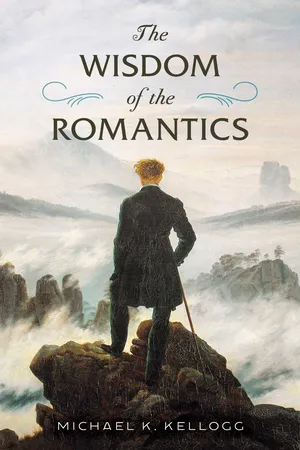
- English
- ePUB (mobile friendly)
- Available on iOS & Android
eBook - ePub
The Wisdom of the Romantics
About this book
Explore the transformative power of Romanticism—where emotion, imagination, and contradiction collide—through the eyes of its greatest thinkers and artists.
The post-Enlightenment movement known as Romanticism is a messy period; so messy, in fact, that many scholars eschew any attempt to define it. In reaction to the overreliance placed on reason by Enlightenment thinkers, Romantics emphasized individual freedom, emotional intensity, introspection, sincerity, and heightened imagination. They sought out nature at its wildest and most sublime: tall mountains, steep gorges, and resounding cataracts. They dabbled in the gothic and grotesque, in mythology, the sacred, and the mystical. Romanticism was a turning inward into subjectivity.
In The Wisdom of the Romantics, author Michael Kellogg profiles such disparate authors as Rousseau and Balzac, Goethe and Hegel, Wordsworth and Jane Austen, revealing that classifying Romantic thinkers is a highly subjective enterprise – which is the whole point.
That isn’t to say that the change in thinking was inconsequential. Far from it. The transition from Haydn and Mozart to Beethoven and Chopin could not have been more dramatic. The German-born composer Giacomo Meyerbeer brought grand opera to new heights. The paintings of Francisco Goya, William Blake, Caspar David Friedrich, and J. M. W. Turner were all part of the transition away from a classical, academic style to the “emotive extremes” that heralded the coming of impressionism in the latter part of the century. In this latest entry into his popular Wisdom series, Kellogg explores the mercurial and ephemeral movement known as “Romanticism,” arguing that what Romanticism “is” includes many contradictions, precisely what the rationalists rejected.
The post-Enlightenment movement known as Romanticism is a messy period; so messy, in fact, that many scholars eschew any attempt to define it. In reaction to the overreliance placed on reason by Enlightenment thinkers, Romantics emphasized individual freedom, emotional intensity, introspection, sincerity, and heightened imagination. They sought out nature at its wildest and most sublime: tall mountains, steep gorges, and resounding cataracts. They dabbled in the gothic and grotesque, in mythology, the sacred, and the mystical. Romanticism was a turning inward into subjectivity.
In The Wisdom of the Romantics, author Michael Kellogg profiles such disparate authors as Rousseau and Balzac, Goethe and Hegel, Wordsworth and Jane Austen, revealing that classifying Romantic thinkers is a highly subjective enterprise – which is the whole point.
That isn’t to say that the change in thinking was inconsequential. Far from it. The transition from Haydn and Mozart to Beethoven and Chopin could not have been more dramatic. The German-born composer Giacomo Meyerbeer brought grand opera to new heights. The paintings of Francisco Goya, William Blake, Caspar David Friedrich, and J. M. W. Turner were all part of the transition away from a classical, academic style to the “emotive extremes” that heralded the coming of impressionism in the latter part of the century. In this latest entry into his popular Wisdom series, Kellogg explores the mercurial and ephemeral movement known as “Romanticism,” arguing that what Romanticism “is” includes many contradictions, precisely what the rationalists rejected.
Frequently asked questions
Yes, you can cancel anytime from the Subscription tab in your account settings on the Perlego website. Your subscription will stay active until the end of your current billing period. Learn how to cancel your subscription.
No, books cannot be downloaded as external files, such as PDFs, for use outside of Perlego. However, you can download books within the Perlego app for offline reading on mobile or tablet. Learn more here.
Perlego offers two plans: Essential and Complete
- Essential is ideal for learners and professionals who enjoy exploring a wide range of subjects. Access the Essential Library with 800,000+ trusted titles and best-sellers across business, personal growth, and the humanities. Includes unlimited reading time and Standard Read Aloud voice.
- Complete: Perfect for advanced learners and researchers needing full, unrestricted access. Unlock 1.4M+ books across hundreds of subjects, including academic and specialized titles. The Complete Plan also includes advanced features like Premium Read Aloud and Research Assistant.
We are an online textbook subscription service, where you can get access to an entire online library for less than the price of a single book per month. With over 1 million books across 1000+ topics, we’ve got you covered! Learn more here.
Look out for the read-aloud symbol on your next book to see if you can listen to it. The read-aloud tool reads text aloud for you, highlighting the text as it is being read. You can pause it, speed it up and slow it down. Learn more here.
Yes! You can use the Perlego app on both iOS or Android devices to read anytime, anywhere — even offline. Perfect for commutes or when you’re on the go.
Please note we cannot support devices running on iOS 13 and Android 7 or earlier. Learn more about using the app.
Please note we cannot support devices running on iOS 13 and Android 7 or earlier. Learn more about using the app.
Yes, you can access The Wisdom of the Romantics by Michael K. Kellogg in PDF and/or ePUB format, as well as other popular books in Philosophy & 19th Century History. We have over one million books available in our catalogue for you to explore.
Information
Topic
PhilosophySubtopic
19th Century HistoryTable of contents
- Cover
- Title Page
- Dedication
- Contents
- Introduction
- 1: Rousseau and Sensibility
- 2: Goethe: Poetry and Truth
- 3: Hegel: The World Spirit Realizing Itself
- 4: Wordsworth: Meaning and Memory
- 5: Jane Austen’s Heroines
- 6: Stendhal on Love and Death
- 7: Alessandro Manzoni and the Great Italian Novel
- 8: John Keats and the Great Odes
- 9: Alexander Pushkin and the Descent into Prose
- 10: Balzac and the Comédie Humaine
- Acknowledgments
- Notes
- Suggestions for Further Reading